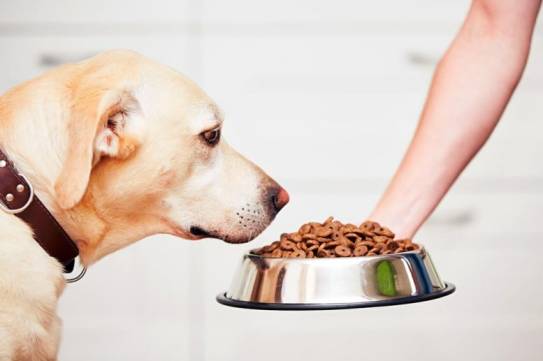If your dog passes gas, vomits, or has loose stools frequently and there is no underlying condition, chances are he has a sensitive stomach.
Connect with a verified veterinarian in minutes. Licensed vets are available 24/7 to answer your questions. No need to worry about your furry family member.
Read on to find out the signs and possible causes of your dog’s digestive issues, learn more about sensitive stomach dog food, and find out how to choose the best formula for your dog.
What Are the Signs of a Sensitive Stomach?
If your dog is vomiting and has diarrhea or excessive flatulence, he probably has an upset stomach.
Common signs of a sensitive stomach are runny stools, gas, and occasional vomiting or dry heaving after eating. These are mild symptoms that can usually be addressed with dietary changes.
When there are more symptoms than occasional diarrhea and vomiting, however, your dog may have an underlying health condition.
What Causes Digestive Issues in Dogs?
The causes of your dog’s upset stomach could be parasites, bacterial infections, bloat, and other serious conditions – so make sure you have ruled out any other health concerns by consulting with your vet.
While many factors could be causing your dog’s digestive issues, research has shown that the most common reason for dogs to have sensitive stomachs is the food they eat.
When you think about it, it makes sense.
Commercial Pet Food
The majority of commercial canned food and kibble is packed with cheap filler ingredients that contain little to no nutrition.
Commercial dog food usually contains animal by-products that are inedible or unsuitable for human consumption – like feathers, feet, wool, and hide. Even worse, these ingredients are usually called “meat by-product meal”– which means you have no idea what your dog is eating.
To cut down on production costs, low-quality dog food is also bulked up with high GI grains like corn and wheat – something that dogs were not designed to eat and that many pets are allergic to.

Review symptoms, medications & behavior to keep your pets healthy with a Vet Online in just minutes.
Ask a Vet Live NowHow to Treat Your Dog’s Sensitive Stomach
Once you’ve ruled out any underlying conditions and have established that your dog just has a sensitive stomach, there are a few things you can do to soothe or eliminate the symptoms.
1. Eliminate Grains
Unlike humans, dogs do not have a high concentration of amylase in their saliva (the enzyme responsible for breaking down starches like wheat) and they have shorter gastrointestinal tracts. Although dogs are omnivores, their diets should ideally consist of meat, vegetables, and very little grain.
Dogs with sensitive stomachs often have problems digesting grains, so switching to a high-quality grain-free formula may be the answer to all your problems.
Try a grain-free formula for a month to see if your dog improves – but remember to transition him slowly and don’t feed him any treats or scraps that contain grains.
2. Find the Culprit
Some dogs with sensitive stomachs have developed an allergy or sensitivity to something they have eaten frequently in the past. Write down everything your dog has eaten recently (including every ingredient) and try to find the common denominator.
By making a list and trying to find a correlation, it will be easier to proceed with an elimination diet and root out the ingredient that’s causing your dog’s upset stomach.
3. Try a Limited Ingredient Diet
Once you have a list of the ingredients that may be causing your dog’s issues, try giving him a limited ingredient diet that does not include anything on your list.
Other than grains, the protein in the food is the likeliest culprit. The trick is to simplify your dog’s diet as much as possible by eliminating all the unnecessary fillers. Choosing a brand that is natural and additive-free will make your job a lot easier.
Pick a formula with one source of protein and feed it to your dog for one month. If this doesn’t work, try another formula with a different protein source and go from there.
Remember to transition your dog to the new formula gradually and eliminate other treats and table scraps.
4. Try Pumpkin and Probiotics
Dogs with sensitive stomachs usually respond well to probiotic and prebiotic supplements – these support your dog’s natural gut biome and restore natural balance by adding beneficial bacteria.
If your dog has an upset stomach, pureed pumpkin added to his food can also help settle his stomach.
When to See a Vet
Chronic diarrhea and vomiting can cause dehydration, so if your dog’s symptoms are severe and persist for more than 24 hours, take him to a vet.
A few other symptoms that indicate that there is an underlying problem are lethargy, pale gums, tremors, seizures, excess salivation, lack of appetite, and behavioral changes.
Connect with a verified veterinarian in minutes. Licensed vets are available 24/7 to answer your questions. No need to worry about your furry family member.

Tom
Tom has always loved to write since he was little - he wanted to be either a writer or a veterinary doctor, but he ended up being a professional writer while most of his works are based on animals. He was born in San Francisco but later moved to Texas to continue his job as a writer. He graduated from the University of San Francisco where he studied biotechnology. He is happily married and a soon to be father!
Review symptoms, medications & behavior to keep your pets healthy with a Vet Online in just minutes.
Ask a Vet Live Now



